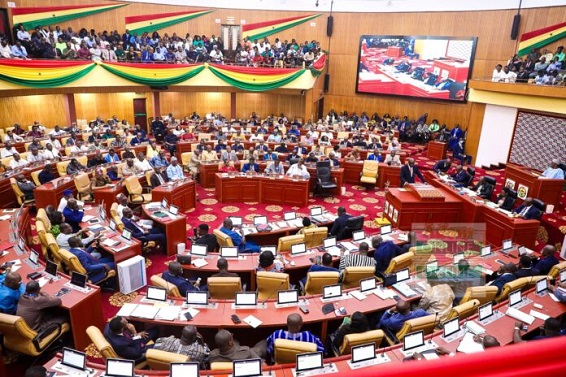The Parliament of Ghana has approved a bill to abolish the Electronic Transactions Levy (E-Levy), awaiting presidential assent to become law.
Introduced in 2022, the e-levy imposed a tax on mobile money and electronic transactions, a policy that faced widespread opposition from businesses and the public.
The e-levy Repeal Bill passed the consideration stage today with bipartisan support, marking a key step toward its elimination from the tax system.
During a brief parliamentary debate, former Deputy Finance Minister Dr Stephen Amoah, who backed the motion, urged the government to exercise caution when repealing crucial revenue policies, especially as the economy continues to recover.
“I also rise to support the repeal of this electronic bill, but then I have a few comments. Mr. Speaker, if you read the bill, there is this essential extract that illustrates the fact that when it was being passed, it faced fierce resistance. So we realise that the repeal is being done not because our fiscal space is presented in a manner that will offer us the needed expected impact on our socioeconomic framework as a country, but because of the resistance.
“Mr. Speaker, apart from that, we also realize that although there seems to be restoration of our economy, our fiscal space has also gotten to the level that we have to quickly repeal the bill. There are a few things, Mr. Speaker, other things that time will permit us to do this.
“I only advise that in doing some of these things, the rationale and the reasons should be said that our fiscal space and our economy as a whole will be accorded the needed decision that will rather agar well for the good people of this country. Having said that, Mr. Speaker, I support this motion,” he said.
Also, the Majority Leader Mahama Ayariga Majority stated that abolishing the e-levy would alleviate financial burdens on Ghanaians and revitalise businesses across the country.
“I rise to support the passage of the bill repealing the electronic transfer levy. So Speaker, the report says that if we pass the electronic transfer levy repeal bill, there will be more disposable income in the hands of individuals and households. Why is it so? Individuals and households would have lost the money by way of the deductions imposed by the tax.
“If we repeal the tax and then the individuals are no longer going to be making those payments by way of the deductions, the money will remain in their hands and that is the basis for the committee saying that there will be more disposable income in the hands of the individuals. The money will now be available to them to spend. That is what disposable income is.
“Mr. Speaker, if you look at the fiscal impact analysis which our standing order says we should consider during this stage of the debate, the committee says the committee was informed that the repeal of the levy will result in an estimated loss of 1.946 billion Ghana cedis for the 2025 fiscal year. What it means, Mr. Speaker, is that 1.946 billion, that is close to 2 billion Ghana cedis, would have been paid by Ghanians to the government by way of the deductions based on the tax,” he stated.
He added that, “But if we pass this bill, the deduction will no longer take place and government will lose close to 2 billion Ghana cedis. But the 2 billion Ghana cedis that government is going to lose will now come to Ghanians. So in effect, individual Ghanians who ordinarily would have lost 2 billion Ghana cedis will now retain their 2 billion Ghana cedis. And government that would have gained 2 billion Ghana cedis by way of deductions from normal transfers, government will lose the 2 billion Ghana cedis.
“So this single legislative measure is going to pass on 2 billion Ghana cedis to Ghanians. 2 billion Ghana cedis. 2 billion Ghana cedis. So this is a gift of 2 billion Ghana cedis being given back to Ghanian citizens. 2 billion that they would have paid to government will now be their 2 billion. So this legislation, if passed, gives Ghanians 2 billion Ghana cedis as disposable income that they can spend.”
After considering various comments, First Deputy Speaker Bernard Ahiafor read the bill for the third time and approved its passage.
“The Electronic Transfer Levy Repeal Bill 2025 is read the third. Honourable members, the question is those in favour say yes. Those against say no. The volume of the work is making me speed up. Honorable members, the ayes have it.
“An act to repeal the Electronic Transfer Levy Act 2022 Act 1075 and the Electronic Transfer Levy Amendment Act 2022 Act 1089 and to provide for related matters. Honorable members, the motion is adopted. The Electronic Transfer Levy Repeal Bill 2025 is now read the third time. Yes, Majority Leader,” he said.





